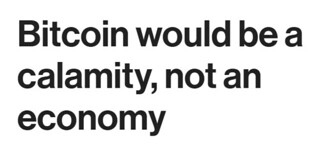
PREV ARTICLE
NEXT ARTICLE
FULL ISSUE
PREV FULL ISSUE
WHY BITCOIN WON'T WORKIn the I-read-stuff-other-than-just-coin-books department are two articles relating to Bitcoins and the future of money. The first is from MIT Technology Review and discusses a point about BitCoin
that I've brought up before - what its backers see as a virtue is also a fatal flaw. -Editor
Still, the dream that cryptocurrency could replace our existing system of fiat money, in which the money supply is controlled by government-run central banks, remains a key part of Bitcoin's appeal. The promise is of a system where the government can't manipulate the money supply, and market competition determines which currencies people use. But what would happen if that dream came true? If the dollar and the euro were replaced by Bitcoin, how would the system adapt, and how would the economy and the financial system function? The simple answer is: not well. Our economies and financial systems are built around fiat money, and they rely on the central bank's control of the currency (and the government's ability to issue debt in that currency) to help manage the business cycle, fight unemployment, and deal with financial crises. An economy in which Bitcoin was the dominant currency would be a more volatile and harsher economy, in which the government would have limited tools to fight recessions and where financial panics, once started, would be hard to stop. The opposite of what you want In an economy run on Bitcoin, these things would be impossible for a central bank to accomplish. To read the complete article, see: Wayne Homren, Editor The Numismatic Bibliomania Society is a non-profit organization promoting numismatic literature. See our web site at coinbooks.org. To submit items for publication in The E-Sylum, write to the Editor at this address: whomren@gmail.com To subscribe go to: https://my.binhost.com/lists/listinfo/esylum All Rights Reserved. NBS Home Page Contact the NBS webmaster 
|
